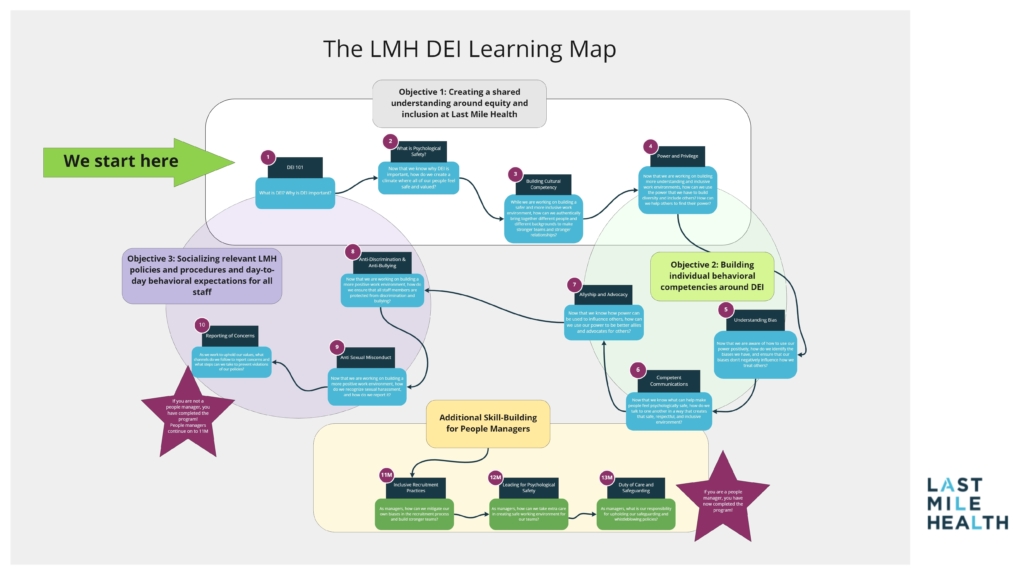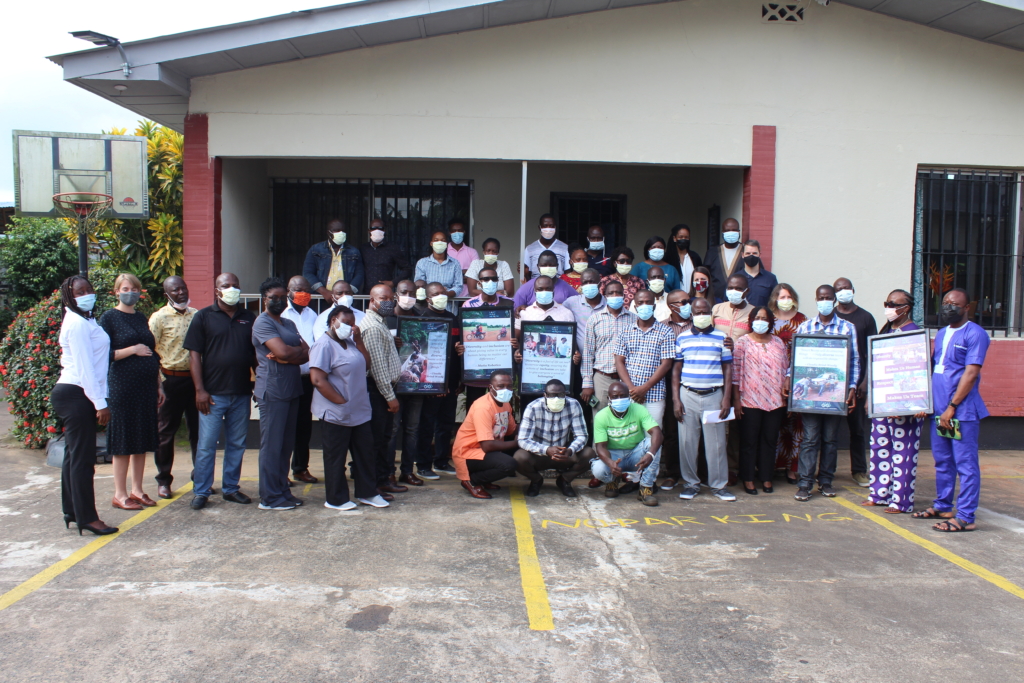By Rachel Saykpah, Musa Kromah, Levison Nkhoma, and Melissa Hallisey
In 2020, Last Mile Health surveyed staff on their personal experiences with inclusion at work. The feedback made it clear that we had a lot of work to do: in how we communicate with one another, how we distribute power and decision-making, and how we promote justice—not only in the communities where we work, but also within our own organization.
As part of our overarching DEI roadmap, we set an ambitious goal: to train all of our staff in the foundational concepts of diversity, equity, and inclusion (DEI) by June 2022. With leadership from our partners, The Better Org, we identified core objectives for our training program:
- Creating a shared understanding around equity and inclusion at Last Mile Health
- Building individual behavioral competencies around DEI
- Socializing relevant Last Mile Health policies and procedures and day-to-day behavioral expectations for all staff
- Building skills of people managers that improve equity and inclusion on their teams and/or with their team members
With The Better Org’s guidance, we created a learning journey map: ten training modules for all staff, and three additional modules for people managers. The training program, developed and facilitated entirely by The Better Org and Last Mile Health staff, would require 16 hours for team members and 19.5 hours for people managers. We would be asking a lot of our staff facilitators and participants—a lot of time, a lot of personal reflection, and a lot of candor with themselves and their peers. But we were certain of the necessity of this work—and the importance of fully investing in it.
In January 2022, the first virtual training cohort launched for staff based in Ethiopia, Malawi, Sierra Leone, and the United States, and in May, our first in-person training cohort began in Liberia. By the close of the fiscal year, 86% of staff had completed the entire DEI training program. We were energized by the results: after completing the program, 83% of participants indicated, “I now reflect regularly on my own beliefs, attitudes, words, and actions towards others to make them more in line with our DEI values.”
“There are positive changes in myself and others,” says Musa Kromah, a quality assurance officer from Grand Gedeh County in Liberia. “Everyone is applying the lessons and skills from the training to one another.”
And Levison Nkhoma, a MERL specialist from Malawi, attests to the training’s staying power. During shared moments, his team often references content they covered in the DEI journey. Even when these references are lighthearted and casual, he says, “Many times, such a reference has triggered a whole conversation on a particular topic. These conversations become a reminder of who we are and the values we stand for.”
The training cohorts were co-facilitated by our partners at The Better Org alongside a group of Last Mile Health staff—and for Last Mile Health co-facilitators, the experience has been a rich opportunity for growth. “The experience has been an overwhelming and exciting moment, because people were willing to listen to me, reaching out to me to help them learn how they can create psychological safety for themselves and people they work with and supervise,” says Rachel Saykpah, a quality assurance officer from Rivercess County in Liberia, who served as a staff facilitator. “Even those who are supervised were reaching out to me about how I can support them so their voices can be heard.”
We’re proud of these successes—but as Rachel adds, “We are still working on practicing DEI, as behavior change is a process.” Our training, too, is far from complete. At present, we’ve integrated DEI training into our onboarding for new hires. Another priority includes creating a DEI knowledge hub that will house micro-learnings on key concepts, internal and external resources for continued learning, a language guide, and more.
We have a long way to go, and we know we’ll make mistakes along the way, both as individuals and as an organization. We must learn new competencies and unlearn old biases. Our journey toward equity, inclusion, and justice is just getting started—but we’re committed to seeing it through with intention and humility.
—
Last Mile Health would like to thank the following staff members who volunteered their time and energy to co-facilitate training sessions: Avi Anshika, Michelle Choy, Brian Fulghum, Melissa Hallisey, Emily Holzman, Siobhan Kelley, Roseline Menden, Savior Flomo Mendin, Lucy Moe, Abigail Nyaka, Hawa Obaje, Dan Owens, Sarah Parish, Camille Phillips, Katelyn Reinert, and Rachel Saykpah. Additionally, our sincere thanks to Bruce Jerkulah, Rose Menden, Abraham Monah, Vivian Samuels, and the entire Liberia Operations team for supporting in-person training logistics. A very special thanks to Melissa Hallisey, who led the coordination and management of the training program—an enormous undertaking.
Finally, our deep gratitude to our partners from The Better Org, Tina Ajuonuma and Lena Bheeroo. We needed your leadership and expertise and we appreciate your accompaniment from start to finish.






